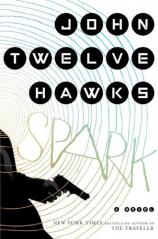Spark
Review
Spark
I’m going to be presumptuous and tell you that Philip K. Dick would have loved SPARK. John Twelve Hawks explores and examines Dick’s familiar topics of reality and perceptions, though from different points and sides of the same mountain, if you will. The author is an enigma, and purposely so; little is known about him (“John Twelve Hawks” is a pseudonym), and his biographical information has been dribbled out parsimoniously. He could be anyone from Stephen Hawking to Rust Cohle to (if time, indeed, is a flat circle) Philip K. Dick himself. What is certain is that he has either marvelous perception or a fantastic imagination, or perhaps both in equal measure.
SPARK is a grim, dark novel that takes place a minute or so from now. The tracking and robotic technology described within the book exists, but isn’t as widespread in “our” world, though it’s most certainly in use just below the surface of our everyday existence. If you’re walking around with a wallet full of credit cards, for example, or riding around in a late model automobile, you’re leaving a trail as certain as if you had a microchip embedded beneath your skin, as is the case in SPARK.
"SPARK, as with the best speculative fiction, goes far beyond its trappings, exploring the issues of what does and does not constitute reality and what shapes our perceptions"
The narrator and driving force of the book is a man named Jacob Underwood, who has a very rare condition known as Cotard’s syndrome. He acquired it as the result of a traumatic and extensive head injury; the effect is that he believes he’s dead. He perceives his existence as a “Spark” that creates his thoughts and, in turn, is housed in a “shell.” As a result, Jacob has no concept of “right” or “wrong,” and no empathy for others (though he believes that people are secondary to dogs). He is unable (but for one example) to interpret facial expressions, and has a series of labeled portraits stored in his smartphone for that purpose.
After his accident and semi-recovery, Jacob is at loose ends employment-wise, until he is plucked up by DBG, a multinational corporation headquartered in New York City. He is assigned to the blandly named Special Services Section, a small, non-descript enforcement division of DBG. What, you may ask, does Special Services enforce? Anything it needs to, in the most final and effective way possible. What is of most importance to his employer is that Jacob, as a result of his syndrome, is able to kill on command without compunction or hesitation. He neither enjoys nor abhors his actions; he just does them. Combine that with the fact that Jacob gives new meaning to the term “low-maintenance,” and you have the perfect employee.
All is well until Jacob botches an assignment. He knows, and his employer suspects that he did so deliberately. Something is changing in him; he’s not necessarily getting better, but it seems as if he might be reacquiring feelings. This possibility becomes a near-certainty when he is given another assignment, one in which (unbeknownst to him) he is being tested. What will occur if he fails again? And if Jacob is in fact recovering, will he ever have the opportunity to live a normal life? Or will he find that he has outlived his usefulness to Special Services?
SPARK, as with the best speculative fiction, goes far beyond its trappings, exploring the issues of what does and does not constitute reality and what shapes our perceptions. John Twelve Hawks peppers the narrative with all manner and sorts of historical and geographical information that, at various times, will have you interrupting your reading to do a bit of research of the “That can’t be true! But it is!” variety. There are also a number of helpful graphs and illustrations scattered throughout the book that demonstrate (to the extent possible) Jacob’s point of view in relation to the world, others and himself. While the narrative occasionally wanders around (if not out of) the room, it is always interesting enough to keep the reader engaged to the story’s conclusion. Let’s hope that the end of SPARK doesn’t mean the end of Jacob Underwood.
Reviewed by Joe Hartlaub on October 10, 2014




